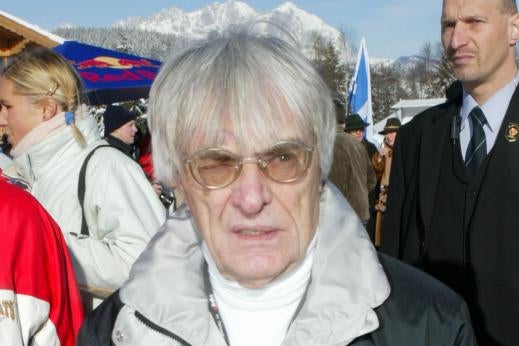Formula One’s owners are driving a hard bargain. Securing $1.6 billion from pre-IPO investors is a big boost as majority owner CVC readies Bernie Ecclestone’s motor-racing circus for a Singapore flotation. The private equity firm will argue that F1’s juicy contracts, minimal costs, and strong brand merit the pricey enterprise value of more than $9 billion. But cracking new markets and media - not to mention succession planning - are big obstacles.
Formula One is an unusual investment proposition, so it is worth looking under the bonnet. The wily Ecclestone has built a profitable company at the centre of a sport watched by more than half a billion people. It holds commercial rights under lease from motor racing’s governing body for the next 98 years.
Promoters, often state-backed outfits keen to boost a city’s profile, can pay $45 million or more a year to host races. Yet F1 keeps most trackside advertising and hospitality dollars; broadcasters pay to cover the contest and take race footage shot by F1; and sponsors pay for exposure. On top of this, the group takes a cut for masterminding the globe-hopping bazaar of cars, kit, drivers, engineers and hangers-on. All this yields plenty of cash with limited central costs. Long deals mean F1 has a $7 billion-plus contract backlog.
Though Ecclestone remains motor racing’s most powerful figure, he now holds a relatively small stake in the business. CVC bought a majority from BayernLB, the German bank, in 2006 and later folded in the Allsport marketing business. Before the latest deal, it owned 63.4 percent of the parent company. The Lehman Brothers estate and JPMorgan, former lenders, own 15.3 and 3.1 percent respectively. Ecclestone owns 5.3 percent, while Bambino, a family trust, owns 8.5 percent. Big dividend payments, funded by new loans, meant CVC has already more than recouped its original investment.
F1’s most important partners, however, are the racing teams. It splits the spoils with Ferrari, Red Bull, McLaren and nine others under a multi-year compact called the “Concorde agreement”. The next one should run from 2013 to 2020. This will give the teams a bigger cut of a bit more than half F1’s EBITDA. Ferrari, synonymous with the sport, gets preferential treatment.
The sale of a stake to Waddell & Reed, Norges Bank, and BlackRock gives F1 an equity value of $7.2 billion, according to FinanceAsia. Add debt of $1.9 billion, and the deal implies an enterprise value of $9.1 billion. This sets the floor for the IPO.
Suppose CVC and others manage to sell $3 billion of stock at a $10 billion enterprise value. That would be the third-biggest flotation ever in media and entertainment, Thomson Reuters data show. No up-to-date financials are available yet, but after subtracting money paid to teams, F1 probably made nearly $500 million in EBITDA last year, people familiar with the matter reckon. If this rises by 10 percent in 2012, F1 would be valued at 18.2 times this year’s EBITDA - twice the average multiple for media groups with market values of $10 billion or more, Starmine data show.
F1 could argue its brand cachet makes it more like a luxury firm. But even in this sector, the largest apparel and luxury firms trade on average at no more than 14 times EBITDA. The last big buyout of a global sport franchise - the takeover of Manchester United, the soccer club that also wants to float in Singapore - was valued at 16 times EBITDA.
Moreover, there are plenty of reasons to be cautious. Key markets such as the United States and China remain under-penetrated. The fanbase is greying, and a clearer focus on new media is probably needed to draw in younger fans. F1’s television strategy, so far focused mostly on sponsor-friendly free-to-air channels, might need a re-think too.
Revenues may be wobblier than they appear. Race promoters, which are typically locked in to hefty automatic fee rises every year, might revolt. Then there is always the threat that teams stage their own breakaway tournament - although the hurdles are high, and previous attempts have always fizzled.
Finally, there is governance. Ecclestone is an 81-year-old autocrat with no clear successor. This may be an easier sell in Asia than in London. The arrival of Nestle man Peter Brabeck as chairman also helps. But investors will have to believe an eventual successor can maintain Ecclestone’s lucrative and gravity-defying balancing act at the heart of the sport.
Read more at Reuters Breakingviews.
